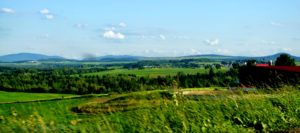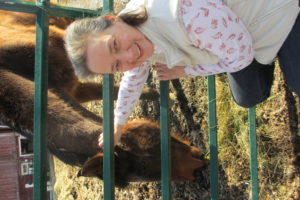This essay is excerpted from QWF Writes.
By Angela Leuck
“We’re thinking of moving to the country,” I told mystery writer Louise Penny when I bumped into her at the Knowlton Literary Festival in 2010, adding that my husband and I weren’t sure if it was the right thing for our writing careers. Penny was enthusiastic: “Do it,” she said, “while you can!” A few months later, we bought a 200-year-old farmhouse in the tiny hamlet of Hatley.
For Penny, living in the country proved no hindrance to her career. Her depiction of the fictional village of Three Pines and the eccentric characters who inhabit it launched her to international success. Now on the sixteenth volume of her Inspector Gamache series, she has sold over six million books worldwide.
Danish-born Anne Fortier lives in the village of North Hatley, nestled at the northern end of Lake Massawippi. Fortier is the author of the New York Times bestseller Juliet, as well as The Lost Sisterhood, and is at work on her third novel.
Over the years, Quebec’s Eastern Townships have been home to numerous literary figures: novelists Hugh MacLennan and Mordecai Richler, poets F.R. Scott, A.J.M. Smith, Ralph Gustafson, D.G. Jones, John Glassco, Richard Sommer, Susan Briscoe, and more.
I can hear my urban friends protest (although certainly less in these challenging times of coronavirus!): what about the stimulation of the big city, schmoozing with other writers at workshops, book launches, or readings, and those all-important opportunities to rub shoulders with potential publishers? Surely you won’t find that out in the sticks!
Yet living in Hatley, where a local farmer’s manure spreader is often a more common sight than a car or truck, I’m never bored. Outside my window is the natural world—verdant and ever-changing. But then, my writing is closely connected to nature and the seasons.
Continue reading Leuck’s full piece at QWF Writes.
Photo credits: Marjorie Bruhmuller (header banner); Steve Luxton (headshot)

